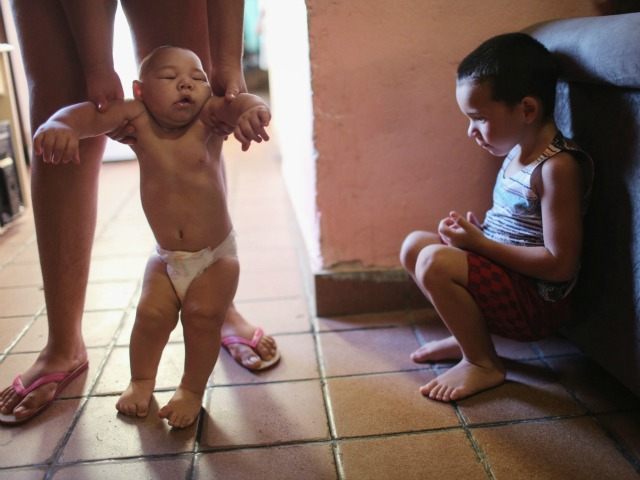Brazil has launched a door-to-door campaign executed by 220,000 soldiers to combat the spread of the Zika virus. The campaign launches as one of the nation’s largest newspapers reports that medical experts have recorded more than 4,000 cases of microcephaly in the nation.
The Zika virus spreads through bites from the mosquito Aedes aegypti, which also carries Dengue, yellow fever, and Chikungunya. The virus is common throughout Latin America and in the warmest parts of the rest of the hemisphere; only Canada and Chile lack an Aedes aegypti population. While medical experts long believed Zika to be a mild viral infection, with symptoms resembling a weaker Dengue fever, Zika appears to be extremely dangerous to pregnant women. Brazilian authorities have documented thousands of cases of pregnant women diagnosed with Zika giving birth to babies with microcephaly, a condition in which the baby is born with an abnormally small head. Children with microcephaly typically suffer severe mental damage.
O Globo reports today that Brazil’s health ministry has announced that the number of diagnosed microcephaly cases where the mother tested positive for Zika has surpassed 4,000, and that they are diagnosing 200 such cases a week. In response, the government will be launching an awareness campaign with the slogan “A mosquito is not stronger than a whole nation.”
The slogan contradicts some controversial comments by Brazilian Health Minister Marcelo Castro, who told reporters on Tuesday that the nation was “badly losing the battle against the mosquito.” The Associated Press notes that Brazil had once eradicated Aedes aegypti entirely in the 1950s, but had since resurfaced in Brazil as populations traveled across Latin America.
Castro has received significant backlash for the comment, AP notes. World Health Organization spokesman Christian Lindmeier described his remarks as “fatalistic.” A columnist for O Globo demanded he resign.
President Dilma Rousseff has promised Brazil will begin “a real battle” against the virus this week, beginning with the soldier door-to-door deployment. The soldiers will distribute informational literature as well as insect repellant, and warn pregnant women especially to protect themselves by wearing long-sleeved clothing and avoiding outdoor activities in humid areas.
The Brazilian government announced that 400,000 women on government welfare will receive insect repellant, as well.
As the Southern Hemisphere’s summer continues, Zika has become a significant problem for a number of countries across South and Central America. In addition to Brazil, the governments of El Salvador and Colombia have warned women to avoid getting pregnant if possible during the warm summer months. San Salvador warned women to avoid getting pregnant between now and 2018 if at all possible, as the nation struggles to enhance its health infrastructure.
The World Health Organization, through its regional branch, has warned Zika will likely spread across all nations on the hemisphere save for the aforementioned Chile and Canada. Cases have been documented throughout the United States – particularly Illinois, Puerto Rico, and New York – though the cases outside of tropical territories have been travelers to nations known to host the offending mosquito.

COMMENTS
Please let us know if you're having issues with commenting.